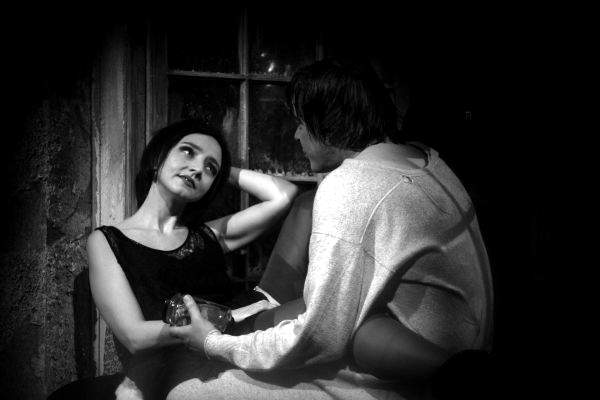Movie review by Greg Carlson
While his films remain an acquired taste for even die-hard cinema buffs, Guy Maddin toils as one of the most original and interesting independent auteur filmmakers working today. Brewing up feverish melodramas with a visual style reminiscent of silent-era masters like Robert Wiene and Dziga Vertov, Maddin’s stunning filmography is consistently rich and rewarding. Having blown a few minds at the 2000 Toronto Film Festival with his jaw-dropping short subject “The Heart of the World,” Maddin is only now beginning to enjoy a broader appreciation for his unusual tales, and his latest, “The Saddest Music in the World,” is also one of his most accessible and enjoyable.
Set in Maddin’s native Winnipeg in the winter of 1933, “Music” is adapted by Maddin and George Toles from Kazuo Ishiguro, but the script has clearly been stamped with all the familiar hallmarks of Maddin’s typically outrageous yarns. Mark McKinney stars as Chester Kent, a Canadian passing himself off as an American stage producer and impresario. Dating the gorgeous Narcissa (Maria de Medeiros), who is equal parts amnesiac and nymphomaniac – and who also makes most of her decisions based on the psychic advice of her own tapeworm – Chester navigates a contentious, stormy relationship with his father Fyodor (David Fox). Chester’s ex-lover (and double-amputee) Lady Port-Huntly (Isabella Rossellini) owns a brewery and is growing ever wealthier from profits made on Winnipeg’s Great Depression status as the “World Capital of Sorrow.” Lady Port-Huntly decides to sponsor a competition to determine the saddest music in the world, and stakes $25,000 as the grand prize.
Complicating matters is the arrival of Roderick (a brilliant Ross McMillan), Chester’s brother. While living in Serbia, Roderick had been married to Narcissa. Paralyzed with heartbreak following the death of their son, Roderick dresses in black and travels around with his child’s heart preserved in a jar of tears. Along with musicians from Scotland, Poland, Siam, Mexico, and many other far-reaching locales, Roderick enters Lady Port-Huntly’s contest, certain that his mournful cello will claim first place.
Maddin has a wicked and sly sense of humor, and the staging of the music competition borders on the surreal, with snippets of songs cut off by blaring warning buzzers and the winners of every round sliding into a giant pool of ale to celebrate their victory. Bagpipers and African drummers share the stage with pan flutists and Spanish guitarists, but none seem able to top Chester’s numerous variations on “The Song Is You,” which always whips the reeling, ossified crowd into a frenzy of cheers and whistles. A pair of radio announcers provides color commentary on the action, and despite their barrage of hilarious one-liners, their presence is mostly unnecessary.
Between the musical showdowns, Maddin cranks up the hallucinatory psychodrama driving the characters. Lady Port-Huntly is outfitted with a pair of prosthetic legs: glass gams filled to the brim with her own sparkling, effervescent brew. Romances are rekindled and alliances are made. The incendiary climax is classic Maddin, as Chester’s American steamroller morphs into a theatrical melting pot, with losing nations joining his team to present a stupefying “California Here I Come.” It’s a clever commentary on the United States’ longstanding global dominance in the export of popular entertainment, as well as a dazzling set-piece. “The Saddest Music in the World” should not be seen without also reading Maddin’s witty, fun, five-part online production diary (at villagevoice.com) – the director is equally talented as an observational essayist.
